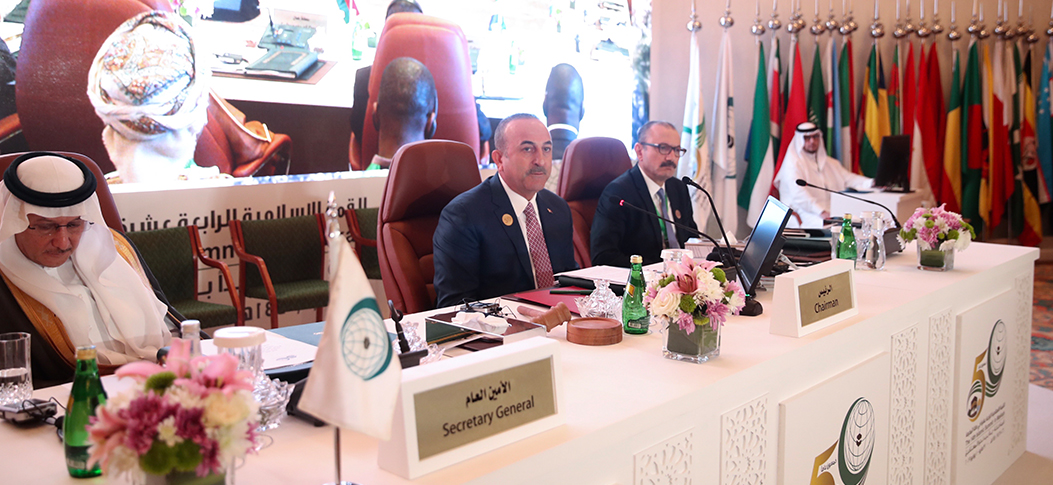“Jerusalem to remain Islamic nations’ red line”

Foreign minister Mevlüt Çavuşoğlu delivered a speech at the Foreign Ministers Meeting of the Organization of Islamic Cooperation (OIC) held at the Congress Palace in Jeddah.
Any peace deal which does not envisage the creation of an independent Palestinian state is bound to be rejected, Turkey’s foreign minister said Wednesday.
"Throughout our Chairmanship, we spared no efforts to defend the rights of the Palestinians as our common cause," Mevlut Cavusoglu told an Organization of Islamic Cooperation (OIC) meeting in Jeddah province, Saudi Arabia.
Cavusoglu said it is "more important than ever" to unite forces and efforts of OIC countries for the establishment of an independent, sovereign and contiguous Palestine. "This is a responsibility that falls first and foremost on our shoulders.”
He stressed that all member nations need to renew their commitment to the preservation of the status of Jerusalem and emphasized it will remain a red line.
"I am therefore confident that any peace deal which does not envisage the creation of an independent Palestinian state with Al-Quds Al-Sharif as its capital is bound to be rejected by the OIC community," Cavusoglu said.
On Syria, he said Turkey assumes a leading role in international efforts to reach a sustainable political solution.
"Our work within the Astana platform continues to de-escalate tension on the ground and facilitates the political process.
"Idlib Memorandum prevented not only a humanitarian disaster and massive refugee flow towards Turkey, but also the collapse of political process," Cavusoglu said.
Turkey and Russia agreed last September to turn Idlib into a de-escalation zone in which acts of aggression would be expressly prohibited.
The Syrian regime, however, has consistently broken the terms of the cease-fire, launching frequent attacks inside the de-escalation zone.
Syria has only just begun to emerge from a devastating conflict that began in early 2011 when the Assad regime cracked down on demonstrators with unexpected severity.
Turning to Libya, Cavusoglu emphasized there is no alternative to a political solution to the war-ravaged nation.
In early April, Gen. Khalifar Hafta launched a campaign to capture Tripoli from Libya’s UN-recognized Government of National Accord (GNA).
Libya has remained beset by turmoil since long-serving leader Muammar Gaddafi was ousted and killed in a bloody NATO-backed uprising in 2011.
Since then, the country has seen the emergence of two rival seats of power: one in eastern Libya, to which Haftar is affiliated, and the other, the GNA, in Tripoli.
On Kashmir, Cavusoglu said the conflict should be resolved through dialogue between India and Pakistan.
Jammu and Kashmir, a Muslim-majority Himalayan region, is held by India and Pakistan in parts and claimed by both in full. A small sliver of Kashmir is also held by China.
Since they were partitioned in 1947, the two countries have fought three wars -- in 1948, 1965 and 1971 -- two of them over Kashmir.
Indian and Pakistani troops have also fought intermittently since 1984 in Siachen glacier in northern Kashmir. A cease-fire came into effect in 2003.
Some Kashmiri groups in Jammu and Kashmir have been fighting against Indian rule for independence or for unification with neighboring Pakistan.
Cavusoglu also said Turkey worked hard to tackle other major challenges that Muslims are facing around the world during its chairmanship of the OIC.
"However, we are still at a beginning stage of a long fight against Islamophobia and the toxic ideologies behind it," he added.

